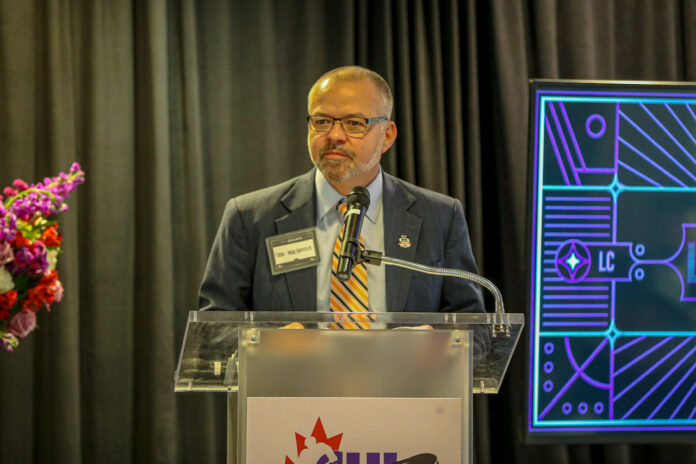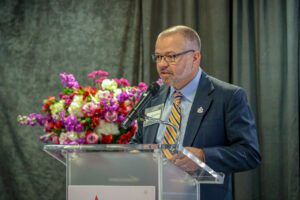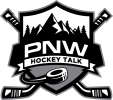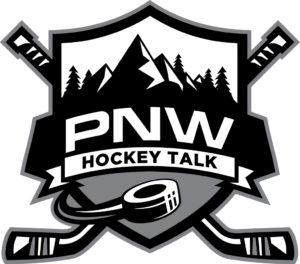
At the end of the day, the 2024 Memorial Cup will be awarded to either the London Knights or Saginaw Spirit, who are hosting this year’s tournament. This marks the first time since 1998 that the Memorial Cup is being played on American soil.
On Friday, the Canadian Hockey League presented me with an opportunity to connect one-on-one with President Dan MacKenzie for 15 minutes before the semi-final between Moose Jaw and Saginaw. I was able to ask him several questions about what is going on around the CHL and his perspective.
Similar to how I presented my interview with new WHL Commissioner Dan Near earlier this week, and ‘State of the Org’ conversations with Portland Winterhawks owner Michael Kramer, I will provide my conversation with MacKenzie in a question-and-answer format. This allows everyone to read what I asked Dan and how he answered each question without me applying any unintentional spin.
I want to say thank you to both Dan and the CHL for giving me this opportunity.
Josh Critzer – Dan (MacKenzie), what are your overall thoughts and impressions about the Memorial Cup being back in the United States for the first time since Spokane?
MacKenzie – “This is our first time we’ve been in the United States and in an OHL (Ontario Hockey League) city. It has been a long time since we’ve been in the United States. It has been outstanding. The community has really embraced the Memorial Cup. When the Saginaw Spirit won the bid, they talked a lot about what the event would mean to the community, how they were going to leave a legacy, how they were going to have a really good hockey team, and how they were going to really use the Memorial Cup as an opportunity to really showcase their community. They were going to drive change in the community with infrastructure, and they checked all those boxes. You didn’t get a chance to be in this arena before the renovations. They’ve done north of ten million dollars worth of upgrades to the arena, including new dressing rooms, a whole new suite level, new ice plant, and are really setting themselves up to be a bit of a hockey hub in this part of the country, which is great for the growth of the game. It is great for the growth of OHL hockey in Michigan which is really important for us as we try to get more and more and more U.S. players into the CHL. That has been really good.
When I look at what they’ve done and the way they’ve treated the Memorial Cup, it is a very historic trophy, but a lot of the history and tradition are tied to Canada. They’ve really tried to understand the tradition and bring the events and activities in Saginaw in such a way that is authentic and American while still respecting the traditions of Canada. It has been pretty special.

From what you’ve seen so far, do you think it is more likely that the Memorial Cup will return to the United States in future years? For example, I know Portland has been very open about putting in a bid for 2026, and I imagine there are other United States teams who might be looking as well. Has the CHL learned anything from Saginaw about the viability of being in the United States again?
MacKenzie – “It is a great question, and we have, but we are still in the process of learning. We did have some groups from the WHL and some teams in this week to see what has gone on here in Saginaw. My events director has met with them and answered all their questions. Some of those teams were U.S.-based teams, and not just Portland; there were some others. What we really want, and ideally try to do, is that any team in the CHL, if they have the right infrustrcutrue, the right team, and the right plan, can host the Memorial Cup. That is still the hope, but it is probably a little premature to make any announcements from an operational perspective about all the elements of having it back in the U.S. since we aren’t quite through it yet. When I chatted with the folks from Portland, we talked a little bit about that. We will know in the next three or four weeks what the implications are, but I’m confident that we will be able to get them figured out.”
Another key topic lately is all the discussion around what is going on with the NCAA and the possibility of CHL players being able to play there afterward. Can you share an update on what is going on there? Also, would you support that model as the CHL President?
MacKenzie – “One of the challenges with the topic right now is we don’t know exactly what is going to happen. There are lots of rumors and lots of changes at the NCAA level that aren’t being driven by hockey and are being driven by other sports that will have implications. Right now, we are at a position of trying to understand what all the implications are.
We are the best junior hockey league in the world. We develop more players for the NHL than anybody else. When the time comes, and we have a little bit more certainty and what the changes are going to be, we will be ready. We’ve started to have some discussions and strategies on what the various implications if this happens; what does this mean for the CHL? What does it mean with various organizations that are an important part of the space and it has the potential to be status quo? It also has the potential to drastically change how players develop. We are going to be ready if and when that time comes.”

Is it something you would support if it was up to you; having the players in the CHL be eligible to play NCAA afterwards?
MacKenzie – “I think we want to have the best opportunity to develop. We have a really strong partnership with U Sports in Canada. A lot of our players go on and play University in Canada. Those are some of the implications we are trying to think through: what would happen if the rules were to change? At the end of the day, we want the best opportunities for the players. If that ends up being that they play in the CHL and then play in the NCAA, great. If it ends up being the status quo, CHL to U Sports, that’s fine, too. I think the key thing for us is that the players are going to be supported through that process and have options. The vast majority of our players even though we produce a lot of pro players, most of our players don’t play professionally. The scholarship makes sure that they get credit for every year they play and get their education covered is really, really important. That is what the vast majority of our players are going to experience.”
What are the priorities for the league over the next 3-5 years? How about growing the game, to digital, to streaming, and any other ways that might be important to you to develop? What are some of your priorities?
MacKenzie – “One of the things that is at play is a bit of a transition of leadership. The CHL is a confederation of leagues. We have three leagues under the CHL banner. I haven’t been here that long, only four seasons, including two in the COVID era. Dan (Near) is new (WHL), and we have a new commissioner in the QMJHL in Mario Cecchini. Then, in the OHL, David Branch, long-time commissioner, is going to be retiring at the end of the season. His replacement hasn’t been named, but it will be coming soon. We are going to have a new set of leaders in those positions. I think that process alone will bring some new ideas, energy, and innovations. We’ve already seen it with Dan Near.
When I think about the priorities for the CHL, I think about player development and player recruitment being critical. I think when I look at our CHL event calendar, we have the Memorial Cup, a prospects event, and we don’t have the Canada/Russia series anymore, given the situation going on over there. I think we are going to probably look to see if we can find another CHL national event that we can bring to life. That is exciting and will provide opportunities to our players and fans that are different. We aren’t quite ready to announce anything yet, but I think you are going to see some real change there.
Then, the topic of the NCAA, that obviously plays into the player development side. Streaming and digital and where we go from a media perspective is going to be really, really important.
We invested heavily in CHL TV over the last three years and are really happy with how that product has evolved. I think the world is moving to living your life on your phone. We need to make sure we are relevant, whether it be live games, highlights, or behind-the-scenes content. All those pieces coming to life on your phone or whatever platform is out there is going to be critical. That is a big focus for our business team.”
Are you pleased with the streaming service’s current state, or do you feel there is still room for improvement?
MacKenzie – “I absolutely think there is room for improvement. I think the user experience perspective has really seen improvements over the last few years. Do you use the service? What is your view?
Critzer – “Yes, I’m a user of the product as I watch a lot of Portland road games and a lot of other U.S. Division games on the platform. I feel the experience changes from rink to rink. There are times when it is a major challenge and then times when some buildings have more capabilities. Not every night is the same experience, such as not having the shot clock or penalty clock overlays; some teams have crystal-clear high definition, and other teams aren’t as crisp, so my experience varies. In some buildings, I know that going in, I will have an easier time covering the game versus other buildings, where I know it will be a battle all night from a reporter’s perspective. It is hit-and-miss, in my opinion.”
MacKenzie – “That is a fair point and talks to the standards. I would say the WHL has generally done a really good job of having standards across the different teams, but there is always room to improve. When you talk about junior hockey buildings, our teams are, by and large tenants in their buildings. Those buildings are run by the municipalities, which is a bit of a unique experience depending upon the market you are in. I think we’ve made some strides, but we still have a long way to go. In terms of where we’ve seen subscriber growth, we really have seen some real upticks the last three years.”

From a player development side, the CCM contract is expiring at the end of next year. The NHL is going through some changes from Adidas to Fanatics. Do you guys keep up on that? How does the league, from both a revenue standpoint but also from a player’s standpoint, view these changes?
MacKenzie – “From a player safety perspective and a quality of equipment perspective, we use the NHL standards. The NHL has a fairly rigorous testing process by which manufacturers can make sure the players are protected in the right ways. We use that same standard. We are actually in the process of determining, both from a jersey and equipment perspective on where we are going to land. We aren’t quite there yet, but it is a really important part of our business both from the standpoint of player safety but also from fan wear and fandom. How fans show the spirit of their team by wearing jerseys and/or products that meet the needs of the current consumers. We watch the trends of what the Fanatics, Adidas, New Era, other companies, and categories are doing. We are in the process of identifying the right way to tackle those. I would say we are at the start of the jersey and equipment, but there will be other categories that we are looking to fill as we go.”
My last question is: What is the biggest challenge or headwind you’re facing as the CHL?
MacKenzie – “Some of the topics like the NCAA are interesting because, again, sometimes the decisions are out of your control. Trying to make decisions with less than ideal or less than full information, causes us to have kinds of areas where I think we have to find solutions. Finding them isn’t always easy until you have the right information. That would be one of them.
I wouldn’t call it a headwind; we are going to be in a good position either way we go. The hockey world, as you know, especially in Canada and the Canadian markets, there is a lot of interest in terms of where things are going with all the rumors and lots of innuendos on various things. That doesn’t help us sometimes. In terms of getting the right information and making the decision, that isn’t always easy. We are focused on making the right decisions with the right information.”






